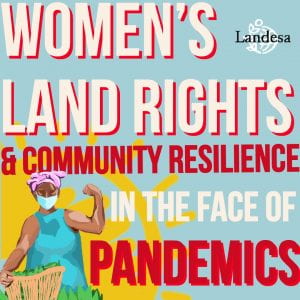My group had the opportunity to work with Landesa, a non-profit organization where their focus is to promote, empower, and secure land rights for millions of the world’s poorest in order to provide opportunity and social justice. Because Landesa works on a more broader range, my group wanted to focus our action project specifically on women’s land rights and food security and connect them with pandemics like the one we are currently in, COVID-19. In order to spread awareness with our topic and research we took on the social media approach.
We learned through our research that women in the areas we looked into make up the majority of the agricultural workforce, and because of the gender disparity that is demonstrated in these areas, and with the current system, women are left in a vulnerable state when pandemics strike their communities. Case studies that have been done in developing countries have shown that with support, women can have great economic and ecological impacts which helps build resilience in their communities.
Through our course we talked about the systems theory. This explains that we are all part of a system(s), and if one part of the system undergo a change then the other parts of that system will be affected. Landesa is performing under this idea, and that their organization is in hope trying to create change in society and rid of the unsustainable systems that are around us.
This theory is demonstrated greatly under our food system. Structural racism lives in this system, while many others as well. However, since our group focused of food security I believe it is necessary to focus on the food system as well. POC often receive low wages in the food industry, and because of this they are forced to face many disadvantages such as hunger. Part of this problem is that there is great disparity between consumers and the food chain since many do not truly know what the process is in order to get the food they are receiving. After this course, I grew to understand more about the food system and the corrupt attributes that take place. Through our action project and tying that with the systems theory, it is crucial that there needs to be more awareness especially with the BLM movement that is currently happening, and for everybody to keep protesting and doing what they can in order to affect our system in the ways that will reach an outcome where we see change for a better future for the POC.




